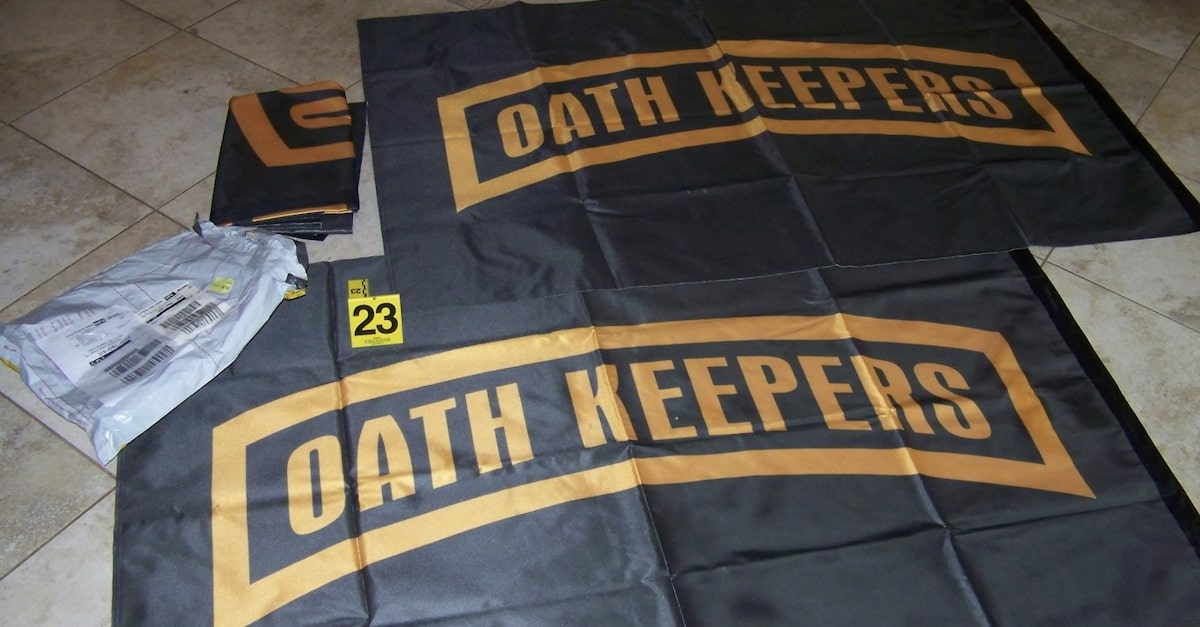
Oath Keepers, with evidence marker, introduced as an exhibit during the seditious conspiracy trial of its leaders.
A defense witness for Oath Keepers founder Stewart Rhodes told a jury on Tuesday that encrypted chats that prosecutors claim show a seditious conspiracy against the United States were just “locker room talk.”
Throughout the ongoing trial of Rhodes and four other Oath Keepers leaders and members, prosecutors have shown a federal jury numerous encrypted messages from the group’s “DC OP: Jan 6 21” chat room, many of the heated.
After one member reported Congress had been evacuated and lawmakers handed out gas masks, Rhodes replied in one message to that chat room: “Fuck em.”
Playing down such chatter, Oath Keepers member Lee Maddox used a phrase former President Donald Trump used to simmer the political scandal created by the release of his Access Hollywood tape.
“A lot of these guys, it’d be like locker room talk,” Maddox said.
Rhodes’s attorney James Bright continued with the analogy.
“You’d agree that some times locker room talk would go too far?” Bright asked.
“Sure,” Maddox replied.
A military veteran who spent eight years in the Army, Maddox said that he turned to the Oath Keepers to find the “brotherhood” and “camaraderie” that he missed in civilian life.
“It feels like you’re naked, you know?” Maddox said. “The Oath Keepers gave me brothers.”
Like multiple Oath Keepers members, Maddox said that he became enraged by flare-ups of rioting during a wave of protests in the summer of 2020. Oath Keepers frequently turned up at the scenes of civil unrest, and Maddox claimed that they were largely welcomed by those communities.
“Every time, people were thankful that we were there,” he said. “Every time.”
Federal prosecutors supplied multiple examples to the contrary during Rhodes’s cross-examination, from law enforcement ordering the Oath keepers to leave Ferguson, Mo., and protesters swearing at them in Lexington, Ky.
Maddox likewise played down the events of Jan. 6: “It was a good day.”
“Everybody was happy. There were kids playing,” Maddox said, adding later: “It was really kind of chill. Nobody was trying to hurt anybody.”
“Where you were?” Bright specified, apparently distinguishing it from the other chaos of the day.
Maddox appeared to suggest his experience was representative: “Yeah, and I was in a big-ass crowd.”
The witness claimed that he had one mission only: “We were going to listen to the President.”
The Signal messages introduced at trial paint a far different and more detailed picture of what happened on Jan. 6, including ones involving other defendants and witnesses.
One of those co-defendants, Jessica Watkins, wrote of her time at the Capitol: “We were in there. Flashbangs, teargassed us.”
Another witness — Donald Siekerman, a member of the Oath Keepers leadership — was confronted with that message during cross-examination. Siekerman himself was not at the Capitol because of coronavirus infection, and he continues to suffer from Long COVID, appearing on the witness stand in a face mask. A retired law enforcement officer, Siekerman appeared emotional upon learning that police were harmed that day.
Prosecutors used his messages from that day, however, to suggest that he knew and approved of exactly what occurred on Jan. 6.
“To my brothers and sisters, my heart is heavy that I could not be there with you. You showed bravery and the warrior spirit!” Siekerman wrote that evening at 7:40 p.m.
Outside the presence of the jury, Assistant U.S. Attorney Jeffrey Nestler warned that certain witnesses called by the Oath Keepers in their defense could have “exposure” and will not be granted immunity by the government to testify. That list included Dario Aquino, who expected to take the stand but ultimately did not after invoking his Fifth Amendment protections against self-incrimination, and Rick Jackson, who did testify despite warnings.
Jackson was one of the men who rode in a golf cart with Roberto Minuta, one of the men charged in the Oath Keepers conspiracy. Unlike Minuta, Jackson says he did not enter the building. He told a jury that he was part of the five-member group assigned to provide security to Trump ally Roger Stone.
“We went back to the Willard to pick up the golf carts that we had for our use,” Jackson testified, referring to the hotel described as a “war room” for Trump associates on Jan. 6.
Though he claimed there was no plan to enter the Capitol on that date, prosecutors confronted Jackson with a message that he wrote weeks earlier on Dec. 20, 2020: “January 6th. The great reset. America or not.”
“We are Patriots we are strong together we shall overcome the evilness that’s before us,” Jackson wrote three days later.
After showing the jury footage of the golf cart ride, prosecutors focused on Minuta’s remarks that they believe should have tipped Jackson off to the scene at the Capitol.
“Fucking war in the streets right now,” Minuta said.
Other prominent Oath Keepers appeared in the Signal chats as well. Unhappy with the fact that the ex-president did not invoke the Insurrection Act to remain in office, Kelly Meggs, the Florida chapter leader of Oath Keepers, fumed “TRUMP is a traitor. !!!” The Oath Keepers believed that Trump could have deputized their group to allow him to maintain his power by force.
“He had the option, and didn’t use it!” Meggs exclaimed, an apparent reference to deploying the Oath Keepers as Trump’s personal paramilitary.
Weeks earlier, an FBI witness said that a member named Paul Stamey gave updates about what happened inside the Capitol from inside the Comfort Inn in Alexandria, Va., where members of the Oath Keepers’ so-called “quick reaction force” stashed their weapons. That witness suggested that the location of the messages suggested coordination between the so-called QRF with weapons and the other Oath Keepers on the ground at the Capitol.